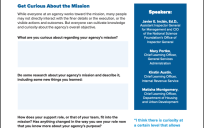Agencies at every level need to teach their workforces the skills that best suit their current situations, according to three experts in government operations.
“Societal needs and demands have a direct impact on the work that you’re doing,” Steve Dobberowsky said on Thursday during GovLoop’s latest online training. “You need to address the workforce and the work needs with your current resources. You simply can’t hire your way out of it.”
Dobberowsky is Principal Consultant for Talent Management Thought Leadership at Cornerstone OnDemand.
Cornerstone OnDemand is a cloud computing-based learning, talent management and talent experience software provider.
According to Dobberowsky, factors such as technological advancement and shifting workforce demographics are rapidly changing public service.
“Change is consistent,” he said. “We really need to adapt to survive. How we deal with those struggles might be different depending on your environment and the regulations that you have.”
Grace A. Jibril is Director of Human Resources (HR) for Anne Arundel County, Maryland’s Department of Health.
According to Jibril, recruitment can become a powerful tool for obtaining the skills agencies need for their latest challenges.
“Human is such a critical term in human resources,” said Jibril, who is also a Professional in Human Resources (PHR). “We’re dealing with human beings.”
Jibril recommends that agencies emphasize the benefits that separate them from their public and private-sector peers when recruiting talent.
“We try to pitch the work-life balance,” she said, referencing her agency’s convenient hours. “The challenge is, ‘How do you keep these folks interested?’”
For agencies, Dobberowsky said, reskilling and upskilling are two valuable alternatives to discovering fresh talent.
“Upskilling is taking a skill and updating it so it’s more relevant,” he said. “It’s taking that skillset and tweaking it a little bit.”
According to Dobberowsky, agencies can upskill employees by teaching them how new technologies can boost their existing capabilities.
Reskilling, he continued, involves teaching workforces the new skills necessary to benefit their agencies in new ways.
“The capability wasn’t there before,” Dobberowsky said. “It’s something you have to plant, nurture and grow in your organization.”
According to Hannah Pickering, Director of IT, Services for Portland, Maine, showing employees how their skills assist their agencies also helps.
“People perform best if they get the chance to feel useful,” she said. “If you develop this skill, you’re aligning yourself with where the department wants to go.”
Jibril said quality talent management can help agencies navigate challenges such as generational retirement waves.
“We have a massive institutional knowledge shift that’s about to happen,” she said of the next crop of retirements. “We need to create mentor-mentee plans and succession plans.”
Jibril added that strong talent management can help agencies balance competing demands from different generations such as Baby Boomers and Millennials.
Baby Boomers are typically considered people born between 1946 and 1964, while millennials are individuals who are widely accepted to have entered the world between 1981 and 1996.
“They both have different priorities,” she said. “The public looks for us to set the stage for what’s happening out there.”
Dobberowsky argued agencies must consider how to best develop their employees’ individual skills or risk disengaging them.
“It’s not just something that’s happening with our HR staff,” he said. “It’s broader than federal, state or local. The public sector has to deal with this.”
This online training was brought to you by:






Leave a Reply
You must be logged in to post a comment.